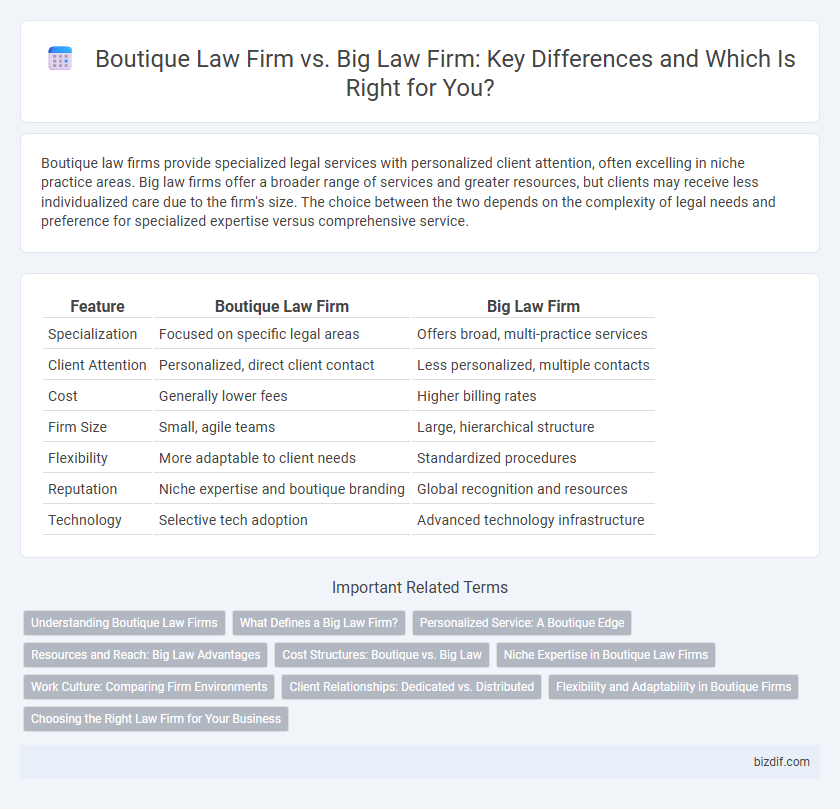Boutique law firms provide specialized legal services with personalized client attention, often excelling in niche practice areas. Big law firms offer a broader range of services and greater resources, but clients may receive less individualized care due to the firm's size. The choice between the two depends on the complexity of legal needs and preference for specialized expertise versus comprehensive service.
Table of Comparison
| Feature | Boutique Law Firm | Big Law Firm |
|---|---|---|
| Specialization | Focused on specific legal areas | Offers broad, multi-practice services |
| Client Attention | Personalized, direct client contact | Less personalized, multiple contacts |
| Cost | Generally lower fees | Higher billing rates |
| Firm Size | Small, agile teams | Large, hierarchical structure |
| Flexibility | More adaptable to client needs | Standardized procedures |
| Reputation | Niche expertise and boutique branding | Global recognition and resources |
| Technology | Selective tech adoption | Advanced technology infrastructure |
Understanding Boutique Law Firms
Boutique law firms specialize in niche legal areas, offering personalized services with deep expertise tailored to specific industries or case types. Unlike big law firms, boutiques provide more direct attorney-client interaction, allowing for agile decision-making and customized strategies. This focused approach often results in higher client satisfaction and specialized knowledge that larger firms may lack.
What Defines a Big Law Firm?
A big law firm is defined by its large number of attorneys, extensive global or national presence, and diversified practice areas serving corporate clients with complex legal needs. These firms typically generate high revenue, maintain hierarchical structures, and offer specialized departments in litigation, corporate law, intellectual property, and regulatory compliance. Their size supports access to significant resources and high-profile cases, contrasting with the more personalized service models of boutique law firms.
Personalized Service: A Boutique Edge
Boutique law firms excel in delivering personalized service by offering tailored legal strategies that directly address each client's unique needs, unlike big law firms where individual attention may be diluted due to vast client portfolios. Boutique firms often maintain smaller teams of specialized attorneys, allowing for closer client relationships and more agile communication. This personalized approach enhances client satisfaction and results in more effective, customized legal solutions.
Resources and Reach: Big Law Advantages
Big law firms possess extensive resources, including large teams of specialized attorneys, advanced technology, and substantial financial backing, enabling them to handle complex and high-stakes cases effectively. Their global reach allows access to cross-border legal expertise, fostering seamless collaboration across multiple jurisdictions. These advantages ensure clients receive comprehensive legal services that boutique firms often cannot match due to limited scale and scope.
Cost Structures: Boutique vs. Big Law
Boutique law firms typically offer more flexible and transparent cost structures, often utilizing alternative fee arrangements such as flat fees or capped billing, making them cost-effective for specialized legal services. In contrast, big law firms rely heavily on hourly billing with higher rates due to extensive overhead and larger teams, resulting in greater overall expenses for clients. The boutique model's streamlined operations and focus on specific practice areas often lead to lower administrative costs, providing clients with tailored legal expertise at a reduced financial commitment.
Niche Expertise in Boutique Law Firms
Boutique law firms specialize in niche areas such as intellectual property, environmental law, or complex litigation, offering tailored and highly specialized legal services that larger firms may not provide with the same depth. Their focused expertise allows for deeper industry knowledge, personalized client attention, and innovative legal strategies specific to their niche market. Clients benefit from a boutique's agility and specialized skill set, often resulting in more effective and efficient legal outcomes compared to the broader, less specialized approach of big law firms.
Work Culture: Comparing Firm Environments
Boutique law firms often emphasize a collaborative and personalized work culture, fostering close-knit teams with specialized expertise and greater direct client interaction. In contrast, big law firms tend to have a more hierarchical structure with formalized procedures, extensive resources, and a competitive environment driven by billable hours. The difference in work culture impacts job satisfaction, with boutique firms promoting work-life balance and big firms offering broader career opportunities but higher pressure.
Client Relationships: Dedicated vs. Distributed
Boutique law firms offer dedicated client relationships, providing personalized attention and tailored legal strategies that prioritize individual client needs. In contrast, big law firms often distribute client interactions across multiple attorneys and departments, potentially diluting direct communication and personalized service. Clients seeking a more intimate and focused legal partnership typically benefit from the hands-on approach of boutique firms.
Flexibility and Adaptability in Boutique Firms
Boutique law firms excel in flexibility and adaptability by offering tailored legal services that quickly respond to client needs and industry changes. These firms maintain smaller teams, enabling direct communication and swift decision-making, unlike big law firms burdened by rigid hierarchies. Their nimble structure allows boutique firms to customize strategies and adjust priorities efficiently, providing personalized client experiences and innovative solutions.
Choosing the Right Law Firm for Your Business
Boutique law firms offer specialized expertise and personalized service tailored to niche industries, making them ideal for businesses seeking customized legal solutions. Big law firms provide extensive resources and broad legal capabilities suitable for large-scale, complex transactions and multinational needs. Choosing the right law firm depends on your business size, industry focus, budget, and the level of individualized attention required.
Boutique Law Firm vs Big Law Firm Infographic

 bizdif.com
bizdif.com